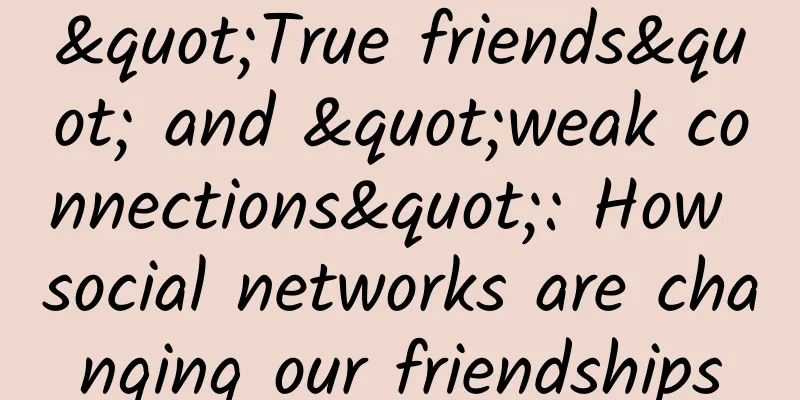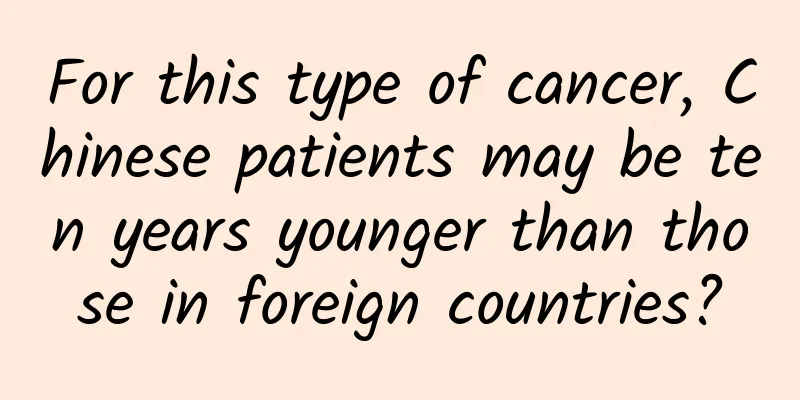"True friends" and "weak connections": How social networks are changing our friendships

|
In this age of the Internet and social networks, our friendships have changed beyond recognition. Former US President Woodrow Wilson once said: "Friendship is the only glue that holds the world together." A century later, has this glue lost its effectiveness in our fast-paced, high-tech, urbanized lives? This can be seen in many clues from the General Social Survey in the United States. According to the survey, between 1985 and 2004, the number of close friends (friends who can be turned to for help in times of trouble) of American citizens fell from three to two, while the proportion of people who had no friends to confide in rose from 8% to 23%. In the UK, the number of people living alone is increasing, and the ties of communities are weakened by the frequent relocation of residents, which has caused a "crisis" of friendship on the verge of collapse. There are also studies linking social isolation to the Internet and mobile phones. However, although new technologies may indeed change traditional friendships, there is also evidence that they have a positive impact on friendships. When Facebook was founded at Harvard in 2004, it was intended to enrich college students’ campus life, and today’s users still use it for this purpose. Danah Boyd, a senior researcher at Microsoft, pointed out: “The motivations of Internet users are no different than before - they make friends online for emotional support, gossip, flirtation, or just company.” Our closest friends are still the same, and they are the people we communicate with most frequently, both online and offline. “It’s just that the way we make friends has changed, because of new technologies and because young people today have their own culture.” The most significant change has been in the number of people we keep in touch with. Researchers at the University of California, Los Angeles, found that the average college student’s number of social network contacts rose from 137 in 2006 to 440 in 2009. The Pew Research Center found in 2013 that today’s typical American teenager has about 300 friends on Facebook and 79 followers on Twitter—but these aren’t all social connections, because they don’t necessarily follow the teenager back. This number far exceeds Robin Dunbar's calculations, which show that our brains are limited by evolution to a maximum of 150 "meaningful friends" (see "Being Smart Enough to Make Friends"). Who are these extra people? They are the so-called "weak ties", including friends from high school and college, past and present colleagues, former partners, travel acquaintances, casual acquaintances, friends of friends, and sometimes strangers. Social networks allow us to keep in touch with these peripheral friends - occasionally sending a message, checking their photos or status updates, etc. In the past, we would not contact them after a breakup. Social networks have expanded our social circles. Those so-called “weak connections” who would no longer keep in touch after separation can now stay in touch through social networks. But technology can do more than that. New research suggests Facebook can even improve the quality of long-distance or fragile friendships. Jessica Vitak of the University of Maryland, College Park, conducted a study of more than 400 Facebook users and found that Facebook is particularly valuable for friends who live more than a few hours away. The farther away the friends live, the more they communicate on Facebook. For these friends, Vitak points out, Facebook may be the difference between a remembered friendship and a real one. Communicating with others online, answering questions or wishing someone a happy birthday on Facebook, complimenting someone on their skills on LinkedIn, and leaving likes or comments on photos on Instagram, are all forms of social grooming, a modern re-enactment of our ancestors’ habits. “These are all ways of showing that I pay attention to you,” says Nicole Ellison of the University of Michigan in Ann Arbor. “Just like primates picking lice from each other, we expect our overtures to be reciprocated — and therefore to receive attention in the future.” Allison and Whitaker found that social grooming on Facebook is very effective at maintaining weak networks, and there are indeed many reasons to maintain these networks. The deep emotional bonds that reflect important relationships still need to be cultivated face-to-face, even if they are formed online. But weak networks have their own benefits. These networks are often diverse and scattered across different social groups. They can provide new perspectives, inspire innovation, lead to job opportunities, and give you a sense of belonging in the community. One striking example of the impact of social networks on our daily lives is the ease with which we can pick up on the emotions of people we barely know. This is actually quite common in the real world—someone smiles at you, and you smile back. But on the Internet, the contagion effect is multiplied. A team led by James Fowler of the University of California, San Diego, analyzed more than a billion Facebook updates and found that users unconsciously spread positive and negative emotions in their comments, even to friends and acquaintances who live in different cities—their weak connections [PLOS One, vol. 9, p. e90315]. “Online, large-scale emotional contagion has only recently become possible,” Fowler says. “I think we’re going to see more global emotional synchronization in the future. We’re feeling more in sync with the world now than ever before.” Social networks in the high-tech era have completely changed our friendships. Image source: New Scientist What people see, what people do Other human behaviors also spread online, including drinking, eating, and dieting habits, but these spread almost entirely among strong connections—close friends and family. The same is true for voting, Fowler found in another study. On November 2, 2010, the day of the US congressional election, Fowler's team posted a message in the news feeds of 61 million US Facebook users, urging them to vote and allowing them to broadcast their voting intentions to their friends. As a result, about 60,000 people who had originally had no intention of voting changed their minds, and also led their 280,000 friends on Facebook. The researchers analyzed these 280,000 voters and found that most of them were friends of the 60,000 users who received the message [see Nature, Vol. 486, p. 295]. “The 10 closest friends drove this social movement,” Fowler said. “This proves that if you want to spread a behavior among a group of people, you have to look at the networks of people in the real world. This is very exciting because it opens up the possibility of using the online world to improve the real world.” Friendships have clearly changed over the past decade, but whether this is a good or bad change is still hotly debated. Studies have shown that connecting with people online has the same psychological value as connecting with people in person, reducing anxiety and depression and increasing happiness. Moira Burke, who studies computer science and social psychology at Facebook, has found that the more people use Facebook to actively connect with friends, the less lonely they feel. However, it is not clear whether using Facebook reduces loneliness or whether people who are naturally more sociable use Facebook more. But maintaining friendships online has its risks. Rachel Grieve, a psychologist at the University of Tasmania in Australia, points out: "Due to the nature of electronic communication, the nuances of interpersonal communication can be lost online. A casual remark made over coffee with a friend can be clarified in a timely manner even if the friend misunderstands it. But once it is online, it will exist forever and many people will see it and misunderstand it." There are more subtle risks, too. As Boyd points out in her book It's Complicated, teens who keep in touch with everyone they know will have trouble forming new, deep relationships when they get to college. "They tend to have a hard time adjusting to the first semester, and they go back to their old friends and neighbors for comfort," she says. Narcissism or need? The most serious criticism of modern social networks is that they promote narcissism and loneliness. "Emotional expression has become a public event now," said Patricia Greenfield, a developmental psychologist at the University of California, Los Angeles. She also cited research by Jean Twenge of San Diego State University, which showed that American college students' scores on narcissistic traits have been rising since the early 1990s. Other studies have shown that narcissistic people are also active users of Facebook and Twitter, both of which are particularly suitable for self-promotion. But others are more skeptical. New research shows that, despite the frequent accusation that today's college students are the most self-centered of all, there is no link between their narcissism and their use of Facebook (Computers in Human Behavior, vol. 32, p. 212). Boyd argues that students are using social media not because they are self-willed or obsessed with technology, but because they need friendship. "When I interview teenagers, they tell me again and again that they would rather meet each other in person, get on a bike, and hang out without any restrictions. But because of the amount of scary information that society spreads about strangers, it has become difficult for these young people to meet and interact outside of the Internet." Our need to connect with others is acute, yet it’s difficult to do so in today’s cities. So how close are we to stepping outside of the human realm and into the world of artificial intelligence? And how complex does a robot need to be to meet the core needs of human friendship, such as reciprocity and personhood? According to Sherry Turckle in her book Alone Together, some social technologies are already able to push our Darwin buttons: some robots can make eye contact with humans, track their movements and gestures, and give the impression that someone is home. Perhaps one day, we will gain friendship from robots. Image source: New Scientist For example, Takayuki Kanda of Japan's ATR Intelligent Machines and Communications Laboratory has developed a humanoid robot called Robovie, whose basic communication skills are sophisticated enough to convince a 15-year-old that it is an emotional, social animal. Kanda said a major research challenge is to develop a robot that can be a companion at all times, not just at home. He speculates that the longer people spend with robots, the easier it will be to establish a "real relationship" with them. John Morray of the University of Lincoln in the UK argues that the key to making robots sociable is to let them make mistakes. Morray and his team are introducing human cognitive biases into the robots’ circuits, such as causing their memories to malfunction and misinterpret human instructions. “We are trying to develop imperfect robots, and maybe humans will accept them more because of this.” He adds that the difficulty in the research is avoiding the “uncanny valley” - when robots look like humans but behave not very human, it will be particularly terrifying. Is this the friendship of the future? Tucker, who directs the "Technology and Self" project at the Massachusetts Institute of Technology, hopes that things will not develop to that point. She said: "Modern people are more obsessed with robots than ever before. We want robots to be good friends with us, to be teachers for our children, and to accompany the elderly. However, the elderly should have someone to talk to about the end of life, what they have lost and what they have loved. The person they talk to should understand what love is and what loss is. A robot will never understand these things." In the 21st century, as in any other era, when it comes to friendship, it’s about quality, not quantity. “A big social network provides a lot of opportunities to network and gather information, but if you want to feel warm and belong, you have to have a few good friends,” Griff said. In other words, as anyone who grew up with the Internet knows, true friendship is when you walk into someone’s home and your smartphone automatically connects to their Wi-Fi. |
<<: Mobile payment survey shows that iPhone users are the most handsome, rich and successful
Recommend
White lumpy stuff
Gynecological problems such as abnormal leucorrhe...
What problems can uterine cold cause?
Uterine cold is a particularly serious gynecologi...
Does drinking coffee really help you lose weight?
Losing weight seems to be a topic that people are...
What are the nutritional preparations before pregnancy?
Now when preparing to conceive, both men and wome...
What causes sacral pain in women?
Once lumbar pain occurs, no matter who you are, y...
What are the symptoms of progesterone deficiency?
Progesterone is a common estrogen and is very imp...
Does ectopic pregnancy cause abdominal pain?
After women become pregnant, they often experienc...
Daily Fresh sold 7 batches of samples including Xiangyang Wojiangyuan Food’s spicy yam slices that failed to meet the standards
On the 13th, the State Administration for Market ...
What are the taboos for pregnant women to eat tangerine peel?
Tangerine peel is both a fruit and a traditional ...
Kingsley Ann Dovi
As we all know, taking folic acid tablets before ...
How long is normal bleeding after medical abortion?
Medical abortion is a type of abortion surgery, w...
Can breast nodules be cured?
Breasts are organs unique to women and represent ...
How long after drinking alcohol can I breastfeed?
Many pregnant women love to drink when they are p...
How to make menopausal symptoms go away
Female menopause is a stage that everyone must go...









